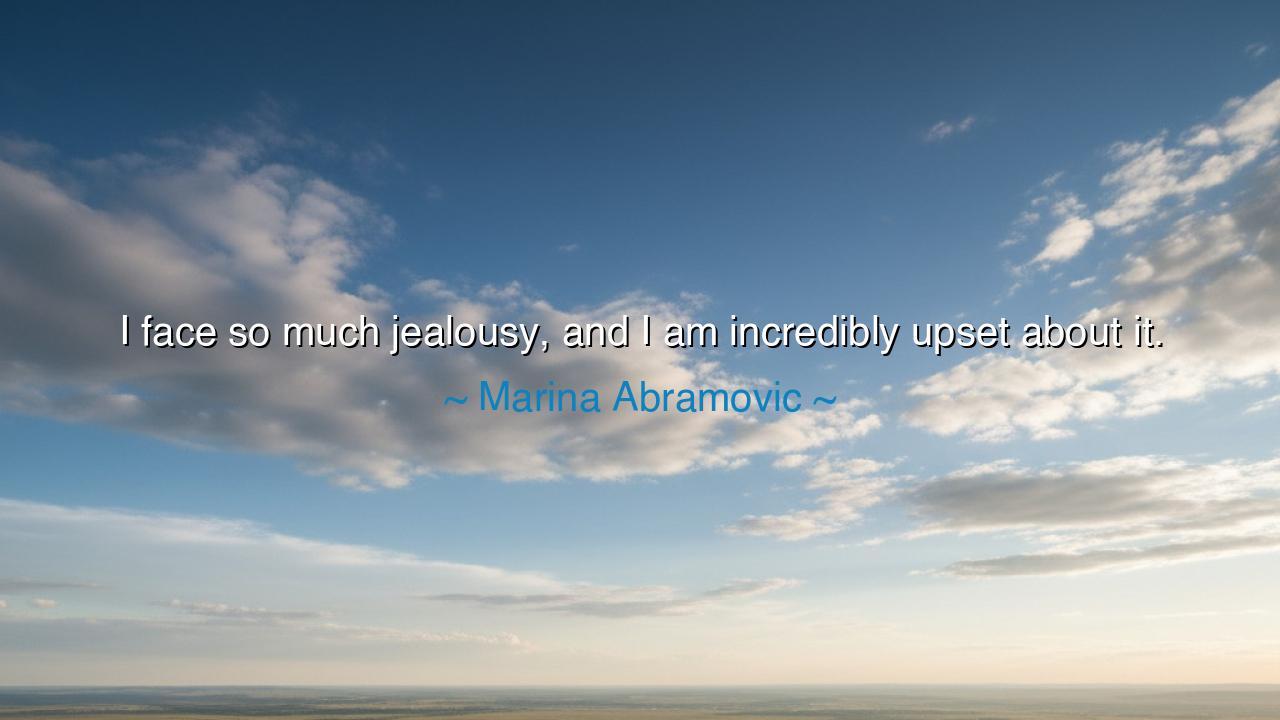
I face so much jealousy, and I am incredibly upset about it.






In the haunting and vulnerable words of Marina Abramović, “I face so much jealousy, and I am incredibly upset about it.” Here speaks not a conqueror, nor a queen, but an artist — a soul stripped bare before the gaze of the world. In her confession lies both pain and truth: that those who walk the path of creation will often awaken jealousy in others, and in so doing, awaken suffering in themselves. Abramović, a pioneer of performance art, has made her very body the stage of her expression — her endurance, her vulnerability, her silence. Yet even in her courage, she is met not only with admiration, but with envy. For the world, unable to understand the courage it cannot imitate, often answers greatness with jealousy, not reverence.
The origin of this quote lies in Abramović’s reflections on her long and often lonely career — decades of pushing the boundaries of art, of confronting the limits of the human body and mind. Known for her raw, transcendent performances, she has endured pain, stillness, and solitude in the name of truth. Yet behind her discipline lies the toll of misunderstanding. The art world, fierce and competitive, has not always welcomed her. Many have looked upon her success not as the fruit of sacrifice, but as an affront — for jealousy is often the shadow that follows light. It does not arise from the unworthy, but from the fearful — those who sense in another what they cannot summon in themselves.
Her lament — “I am incredibly upset about it” — reveals something profound: that even the strongest souls feel the sting of envy’s arrows. It is easy to imagine that the visionary stands beyond emotion, armored by purpose. But Abramović reminds us that the artist is, above all, human — sensitive, permeable, alive to both beauty and cruelty. Her art has always been about presence, about being fully seen, fully felt — and thus she feels envy not as an abstraction, but as a wound. For jealousy, in its essence, is violence without weapon, poison without sound. It diminishes the one who feels it, yet pierces the one who receives it.
Throughout history, those who rise above mediocrity have met the same fate. Consider the life of Galileo Galilei, whose genius opened the heavens but earned the scorn of his peers. He dared to say the Earth was not the center of the universe — and for this, he was mocked, silenced, and confined. His persecutors were not ignorant men; they were learned, but envious — fearful that their own knowledge would be dimmed by his light. In this way, jealousy has always hunted the great. It cannot destroy truth, but it can make the bearer of truth suffer. And yet, despite this, the wise endure — for they know that envy is the tax paid for visibility.
Marina Abramović, like Galileo, understands this truth in the marrow of her being. Her art, born of vulnerability, exposes her not only to applause but to envy. But in speaking openly of her pain, she transforms that envy into art, into a reflection of human frailty itself. She shows us that jealousy is not just a social ill — it is a mirror of our own insecurity, a cry from the heart that has forgotten its own worth. Her sorrow is thus not weakness, but courage — the courage to name what others hide. For to admit that one is wounded is to begin to heal, and to speak of jealousy is to rob it of its secrecy and power.
From her struggle, we learn a sacred lesson: that envy is inevitable where excellence exists, but it must not be allowed to poison the soul. Those who face jealousy must do as Abramović has done — transform pain into purpose. Do not let others’ resentment shrink your spirit. Instead, let it temper you, as fire tempers steel. The wise must remember: jealousy is never about you — it is the reflection of another’s fear that their light cannot shine beside yours. Thus, meet envy not with bitterness, but with compassion; not with retreat, but with persistence.
The path of the creator, the innovator, the visionary, will always be shadowed by jealousy. But take heart: no envy lasts longer than the work that inspired it. Abramović’s art will endure long after the bitterness of her detractors has turned to dust. So, too, will yours, if you persist. Let her words be both warning and encouragement: that to do something truly new is to provoke both awe and envy, both admiration and misunderstanding. Walk forward regardless, for greatness is not found in avoiding pain, but in transcending it.
So, dear listener, remember this: when you face jealousy, when others try to dim your light with doubt or disdain, stand firm. Do not let their envy make you bitter; let it remind you that you burn brightly. As Marina Abramović teaches us through her sorrow, to live courageously — to create, to express, to reveal — is to invite both love and envy. Accept both, endure both, and rise beyond them. For in the end, envy dies, but art — and truth — live forever.






AAdministratorAdministrator
Welcome, honored guests. Please leave a comment, we will respond soon